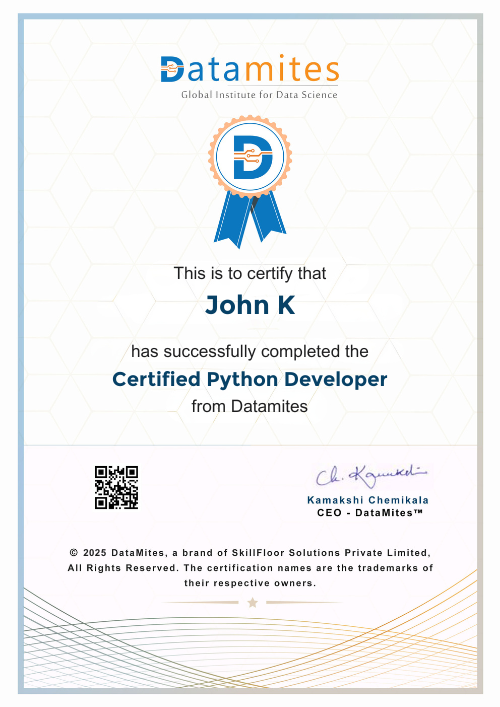Instructor Led Live Online
Self Learning + Live Mentoring
Customize Your Training

• Introduction of python
• Installation of Python and IDE
• Python Variables
• Python basic data types
• Number & Booleans, strings
• Arithmetic Operators
• Comparison Operators
• Assignment Operators
• IF Conditional statement
• IF-ELSE
• NESTED IF
• Python Loops basics
• WHILE Statement
• FOR statements
• BREAK and CONTINUE statements
• Basic data structure in python
• Basics of List
• List: Object, methods
• Tuple: Object, methods
• Sets: Object, methods
• Dictionary: Object, methods
• Functions basics
• Function Parameter passing
• Lambda functions
• Map, reduce, filter functions
• Decorators
• Generators
• Context Managers
• Metaclasses
• Inheritance and Polymorphism
• Encapsulation and Abstraction
• Class methods and static methods
• Special (magic/dunder) methods
• Property decorators - getters, setters, and deletes
• Working with files
• Reading and writing files
• Buffered read and write
• Other file methods
• Logging & Debugger
• Modules and import statements
• SQL Basics
• Creating DB Table
• INSERT, READ, UPDATE, DELETE
• Introduction to MongoDB
• CRUD operations in MongoDB
• namedtuple(), deque, ChainMap,
• Counter, OrderedDict, defaultdict,
• UserDict, UserList, UserString
• Exceptions handling with try-except
• Custom exception handling
• List of general use exception
• Best practice exception handling
• Generators, Iterators
• The Functions any and all
• With Statement
• Data Compression
• A Daytime Server
• Clients and Servers
• The Client and Server Programs
• Classes and Threads
• Multi-threading; thread life cycle
• Regular Expression Syntax
• Group, Split and wildcards
• Quantifiers
• Match, Search and Find all methods
• Character Sequence
• Introduction to OpenCV, Installation
• Basic Operations on Images
• Image Filtering
• Image Classification
• Introduction to GIT
• Basic Git commands
• Introduction to Flask and Installation
• Creating project
• Routing,templates, forms and database integration
• Deployment on render
• Django Introduction and Installation
• Creating a Project
• Django Architecture and File Structure
• Folder Structure, First Django project
• Database and Views, Static Files and Forms
• URL Mapping and Routing
• Defining Models and Relationships
• Database Migrations and Schema Changes
• Querying Data using Django ORM
• Model Forms and Form Validation
• HTML Forms in Django
• Model Forms and Form Validation
• Formsets and Inline Formsets
• File Uploads and Validation
• Deploying Django Applications
• Hosting Options (e.g., Heroku, AWS)
• Project Showcasing and Review
Python is a versatile, high-level programming language known for its simplicity and readability. It supports multiple paradigms and finds extensive use in web development, data analysis, artificial intelligence, scientific computing, and more.
Python is extensively used in data science for tasks such as data cleaning, analysis, visualization, and machine learning. Libraries like Pandas, NumPy, Matplotlib, and scikit-learn enable efficient handling and analysis of large datasets, making Python a preferred language for data scientists.
Yes, Python Certifications can enhance one's credibility and demonstrate proficiency to potential employers. However, practical experience and project work often hold more weight than certifications alone.
Python is widely employed in scientific computing due to its rich ecosystem of libraries such as NumPy, SciPy, and Pandas. These libraries offer tools for data manipulation, numerical computations, and visualization, making Python a preferred choice among researchers and scientists.
To become a certified python developer, individuals can pursue certifications from reputable organizations like DataMites. Preparation typically involves studying Python fundamentals, completing projects, and passing certification exams.
According to Salary Explorer, Python developers in Lusaka command an impressive average annual salary of 74,600 ZMK, reflecting their pivotal role in the city's tech ecosystem.
Employers typically look for Python developers proficient in core Python concepts, web frameworks like Django or Flask, database management, problem-solving, and collaboration skills. Additionally, familiarity with libraries for data analysis, machine learning, or web development is valued.
The demand for python developers in Lusaka is high, driven by the language's versatility and widespread adoption across various industries such as IT, finance, and research. Companies seek Python talent for tasks ranging from web development to data analysis and automation.
While a bachelor's degree in computer science or a related field can be advantageous, many employers in Lusaka also consider practical skills and experience. Completing online python courses, attending bootcamps, or engaging in self-study can also prepare individuals for Python-related roles.
Transitioning into Python programming involves learning Python fundamentals, gaining practical experience through projects, and networking with professionals in the field. Online resources, courses, and communities can provide guidance and support during the transition process.
To start a Python Career in Lusaka, individuals should begin by learning Python fundamentals, exploring relevant libraries and frameworks, and building a portfolio of projects. Networking with professionals, attending meetups, and pursuing internships can also facilitate gaining experience and opportunities.
Python is used in environmental science for tasks such as data analysis, modeling, and visualization. It aids researchers in analyzing large datasets, simulating environmental processes, and developing predictive models for climate change, biodiversity, and pollution studies.
Python is employed in social media for various tasks including data analysis, content moderation, recommendation systems, and automation. Platforms such as Facebook, Instagram, and Twitter utilize Python for backend development, data processing, and implementing AI-driven features.
Python is widely utilized in artificial intelligence for tasks such as machine learning, natural language processing, computer vision, and robotics. Libraries like TensorFlow, PyTorch, and Keras provide powerful tools for developing AI models, making Python a preferred language in the field.
While a degree in computer science or related fields can be advantageous, it's not always necessary for a career in Python development. Employers often value practical skills, experience, and projects, so self-learning, bootcamps, and certifications can also pave the way for a successful career in Python development.
To craft a robust python developer resume, highlight relevant skills, experience, and projects related to Python development. Include details about proficiency in Python, frameworks, databases, as well as any certifications or contributions to open-source projects. Tailoring the resume to the job description and showcasing problem-solving abilities and teamwork skills is also essential.
Python libraries and frameworks are pre-written code collections that offer reusable functionalities to simplify development tasks. Libraries like NumPy, Pandas, and Matplotlib provide tools for specific domains like data analysis and visualization, while frameworks like Django and Flask provide structure and tools for web development.
To install Python, individuals can download the official Python installer from the Python Software Foundation's website and follow the installation instructions. Alternatively, they can use package managers like Anaconda or pip to install Python and manage packages on their system.
Python is employed in game development for tasks such as scripting, prototyping, and building game engines. Libraries like Pygame provide tools for developing 2D games, while engines like Unity and Godot support Python scripting for both 2D and 3D game development. Python's simplicity and flexibility make it a popular choice among game developers.
Job prospects for python developers in Lusaka are promising, with opportunities available in sectors like software development, data science, artificial intelligence, and fintech. Continuous learning and staying updated with industry trends can further enhance career prospects.
DataMites' Certified Python Developer Course in Lusaka covers various aspects of Python programming, including hands-on exposure through internships and live projects with IT companies, ensuring participants are ready for industry demands.
To enhance your python programming prowess in Lusaka, consider enrolling in courses provided by DataMites. These courses offer customized training suitable for individuals at all proficiency levels, fostering hands-on learning experiences to fortify your expertise.
DataMites' Python Developer Training in Lusaka caters to individuals with diverse programming backgrounds, offering them the opportunity to acquire foundational skills essential for Python development roles.
The Flexi-Pass feature within DataMites' Python training in Lusaka allows participants to opt for weekday or weekend batches, providing flexibility to manage their learning alongside other commitments effectively.
DataMites' Python for Data Science Course in Lusaka explores Python's application in data manipulation, analysis, and machine learning, equipping participants with practical skills applicable to real-world data scenarios.
The Python Developer Course in Lusaka at DataMites spans four months, totaling 400 learning hours, providing participants with ample time to thoroughly grasp Python concepts and excel in software development.
If a participant misses a training session in Lusaka, they can access recorded sessions and course materials online and schedule makeup sessions to stay on track with their learning.
DataMites' Python for Deep Learning Course in Lusaka introduces participants to deep learning concepts, enabling them to construct and train deep neural networks using Python libraries like TensorFlow and PyTorch.
DataMites' Data Mining with Python Training in Lusaka explores data mining techniques using Python, equipping participants to extract insights from large datasets and make informed decisions.
The Python training fee in Lusaka at DataMites ranges from ZMW 4421 to ZMW 11450, ensuring accessibility and affordability for participants with different budget constraints.
DataMites' Python for Machine Learning Course in Lusaka introduces various machine learning algorithms and their implementation using Python's Scikit-Learn package, fostering proficiency in building ML applications.
Yes, DataMites offers a demo class for prospective participants in Lusaka, allowing them to experience the teaching methodology and assess the course content before making a commitment.
Yes, DataMites offers Python courses with internship opportunities in Lusaka, enabling participants to gain practical experience and enhance their employability in the field.
Participants need to bring valid photo identification proof, such as a national ID card or driver's license, to obtain the participation certificate during Python training sessions in Lusaka.
Yes, DataMites offers 10 capstone projects and 1 live project as part of its Python Courses in Lusaka, providing practical experience and opportunities to apply Python skills in real-world scenarios.
Yes, upon completing Python classes in Lusaka with DataMites, participants receive IABAC Certification, validating their proficiency in Python programming and enhancing their credibility in the industry.
DataMites' Python developer training in Lusaka covers essential tools such as Anaconda, Google Colab, Numpy, Pandas, PyCharm, and Flask, facilitating effective Python application development.
DataMites' career mentoring sessions in Lusaka offer personalized guidance on resume building, interview preparation, and career goal setting, provided by industry experts to support participants in advancing their careers.
Opting for DataMites for Python Course Training in Lusaka brings several advantages, including globally recognized certifications, expert faculty, updated curriculum, and practical projects, ensuring a comprehensive learning experience in line with industry standards.
DataMites Python training courses in Lusaka accept various payment methods, including cash, debit/credit cards, EMI, PayPal, and net banking, ensuring convenience for participants.
The DataMites Placement Assistance Team(PAT) facilitates the aspirants in taking all the necessary steps in starting their career in Data Science. Some of the services provided by PAT are: -
The DataMites Placement Assistance Team(PAT) conducts sessions on career mentoring for the aspirants with a view of helping them realize the purpose they have to serve when they step into the corporate world. The students are guided by industry experts about the various possibilities in the Data Science career, this will help the aspirants to draw a clear picture of the career options available. Also, they will be made knowledgeable about the various obstacles they are likely to face as a fresher in the field, and how they can tackle.
No, PAT does not promise a job, but it helps the aspirants to build the required potential needed in landing a career. The aspirants can capitalize on the acquired skills, in the long run, to a successful career in Data Science.



